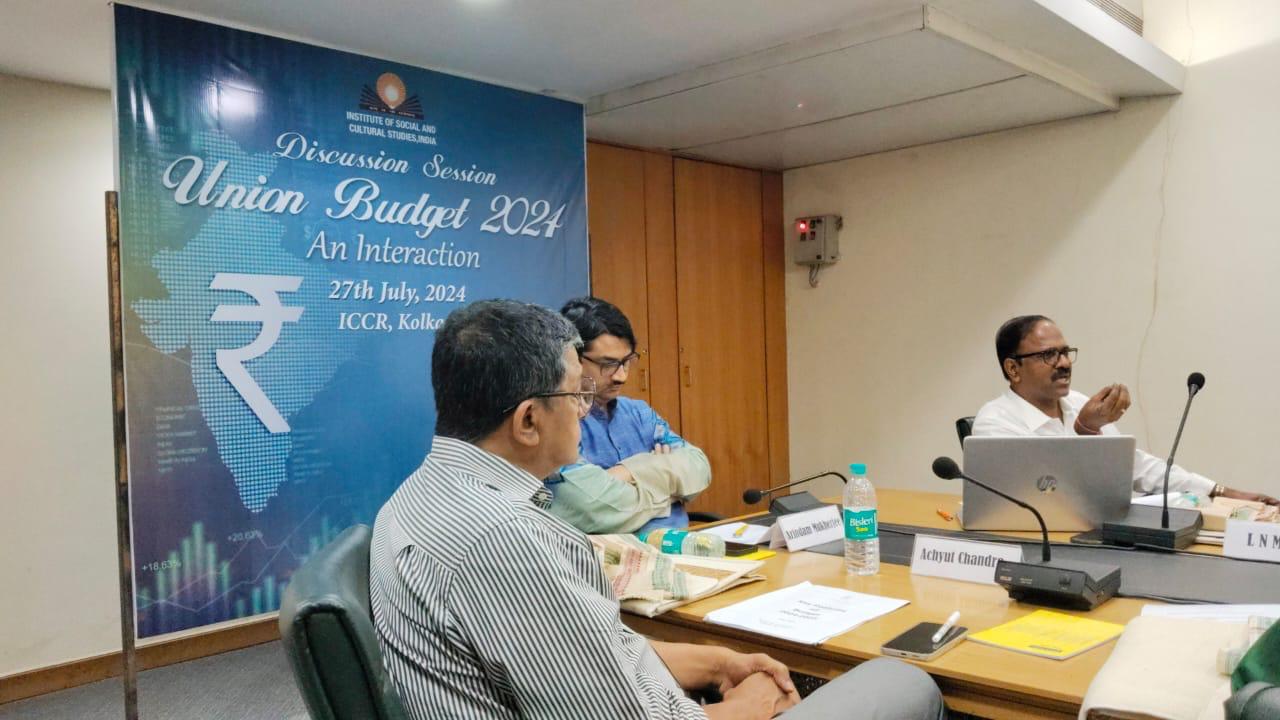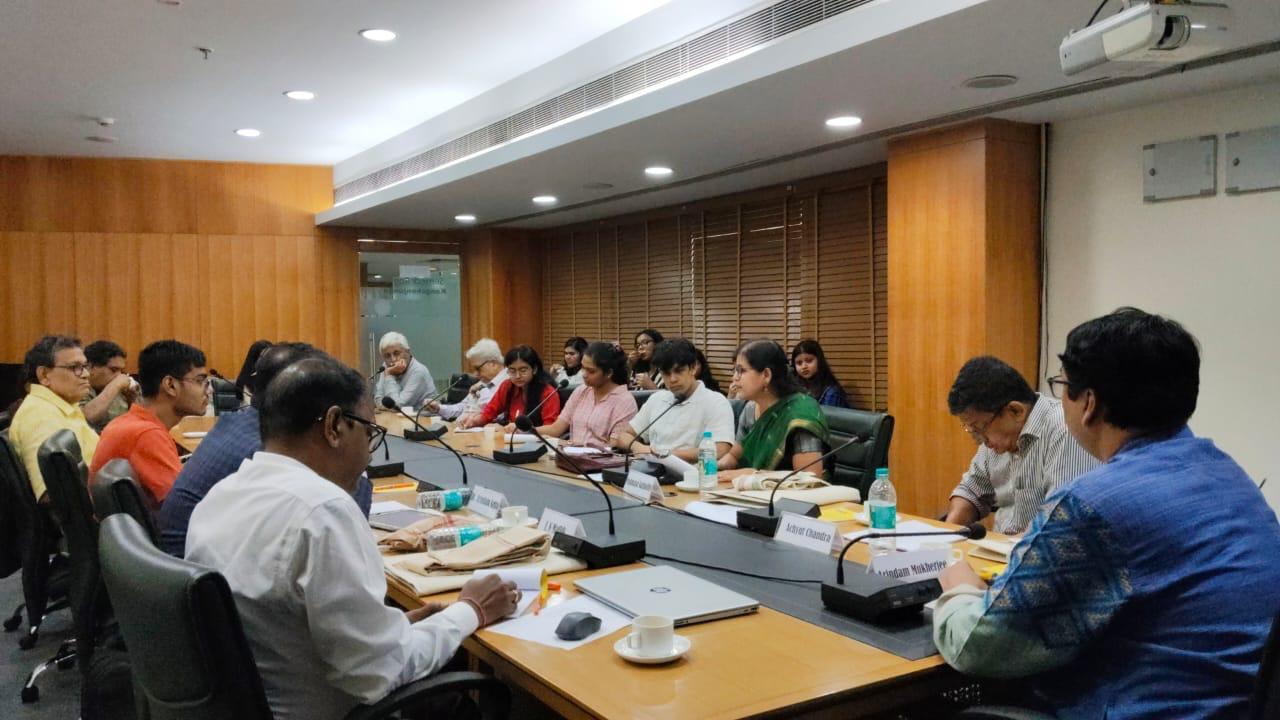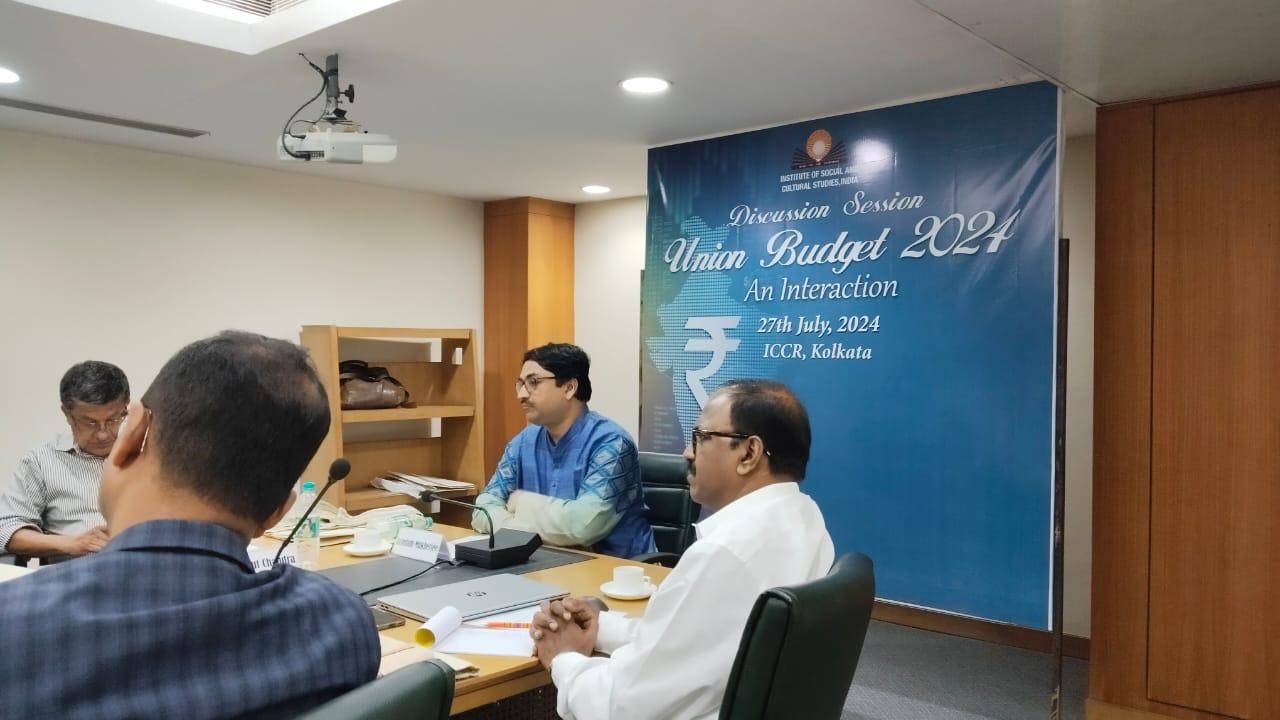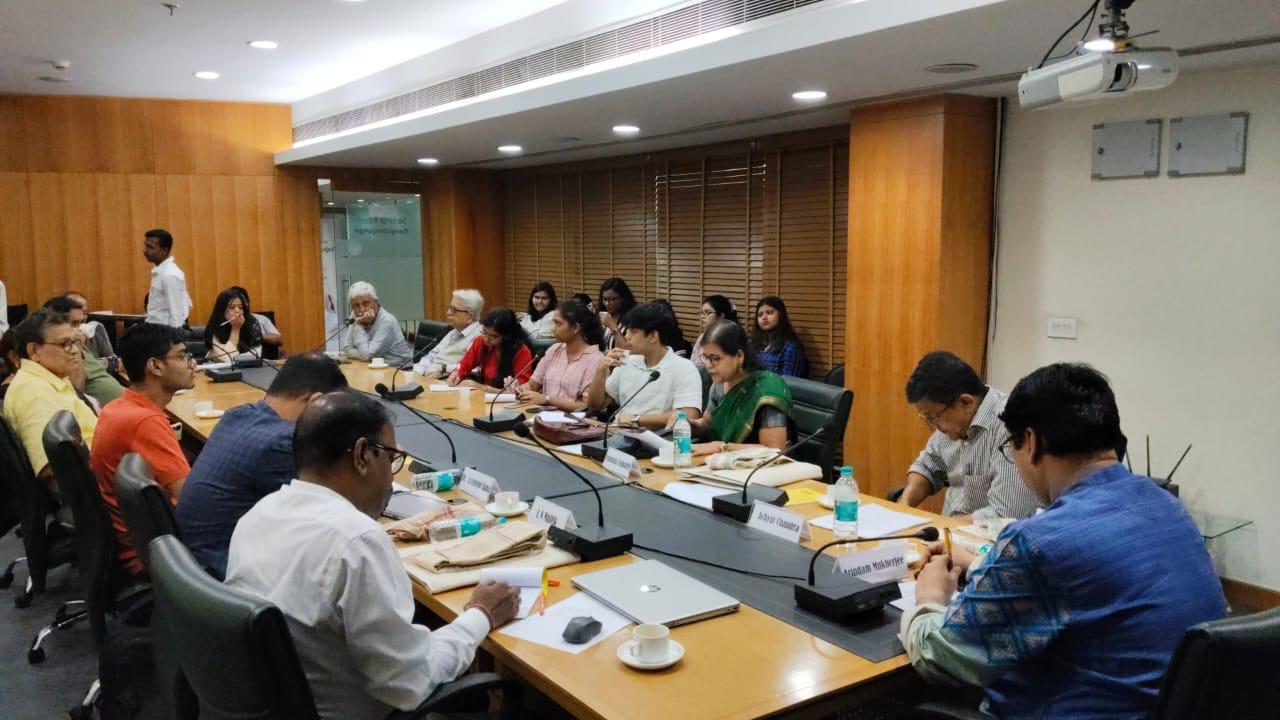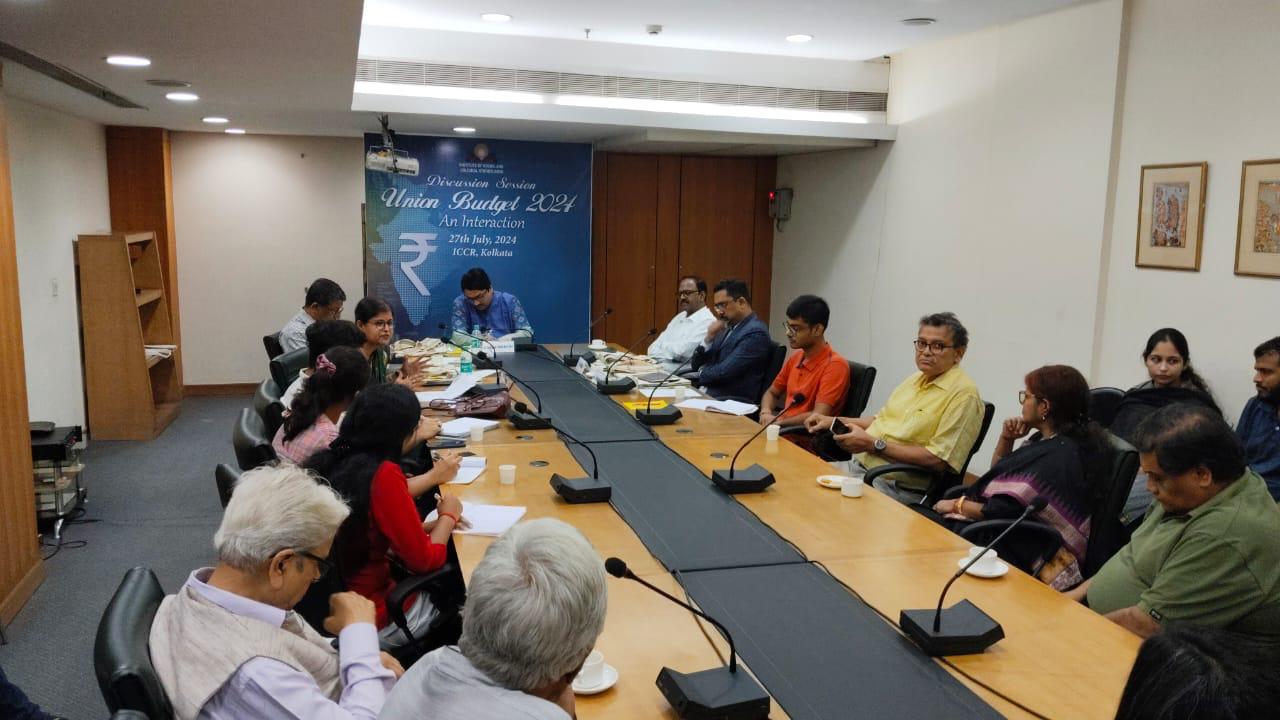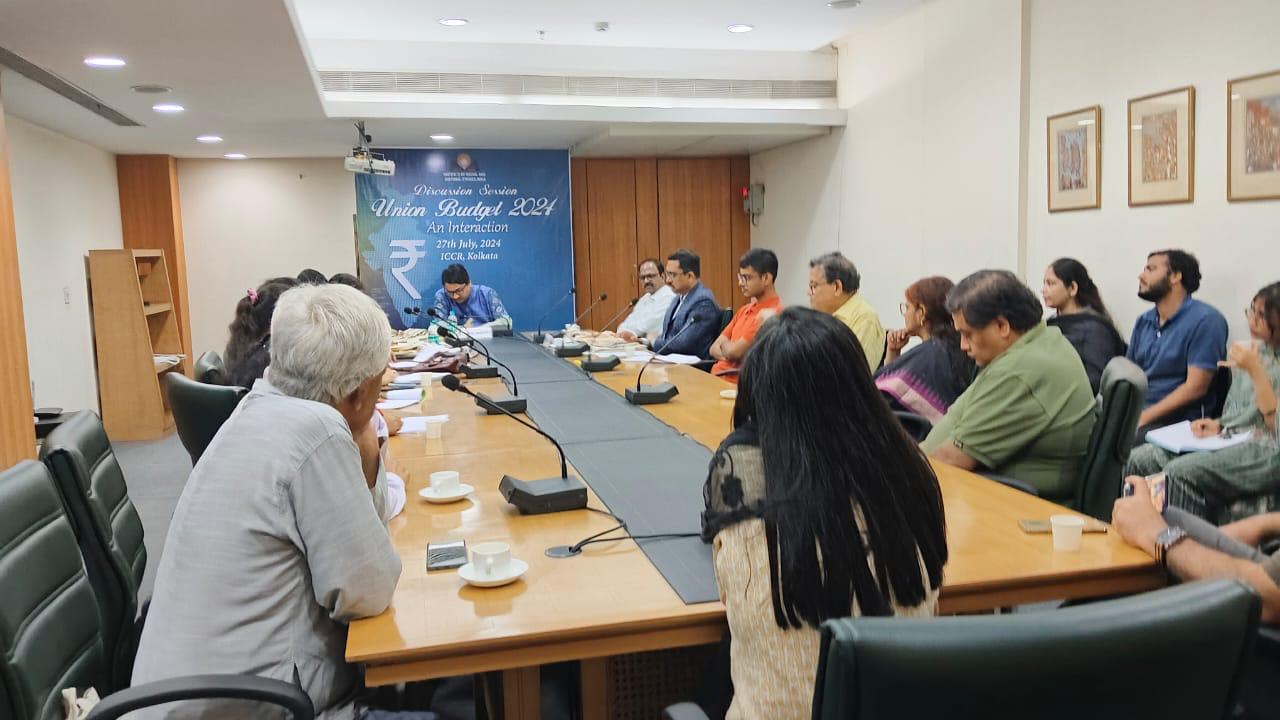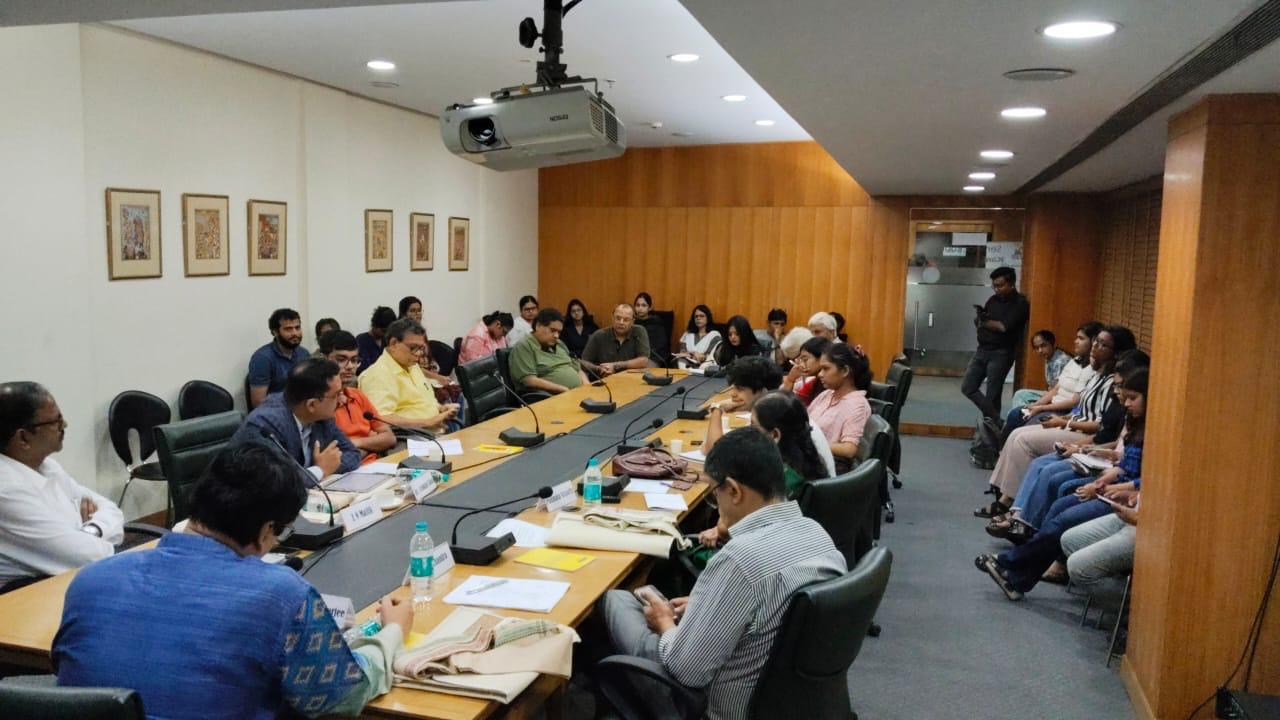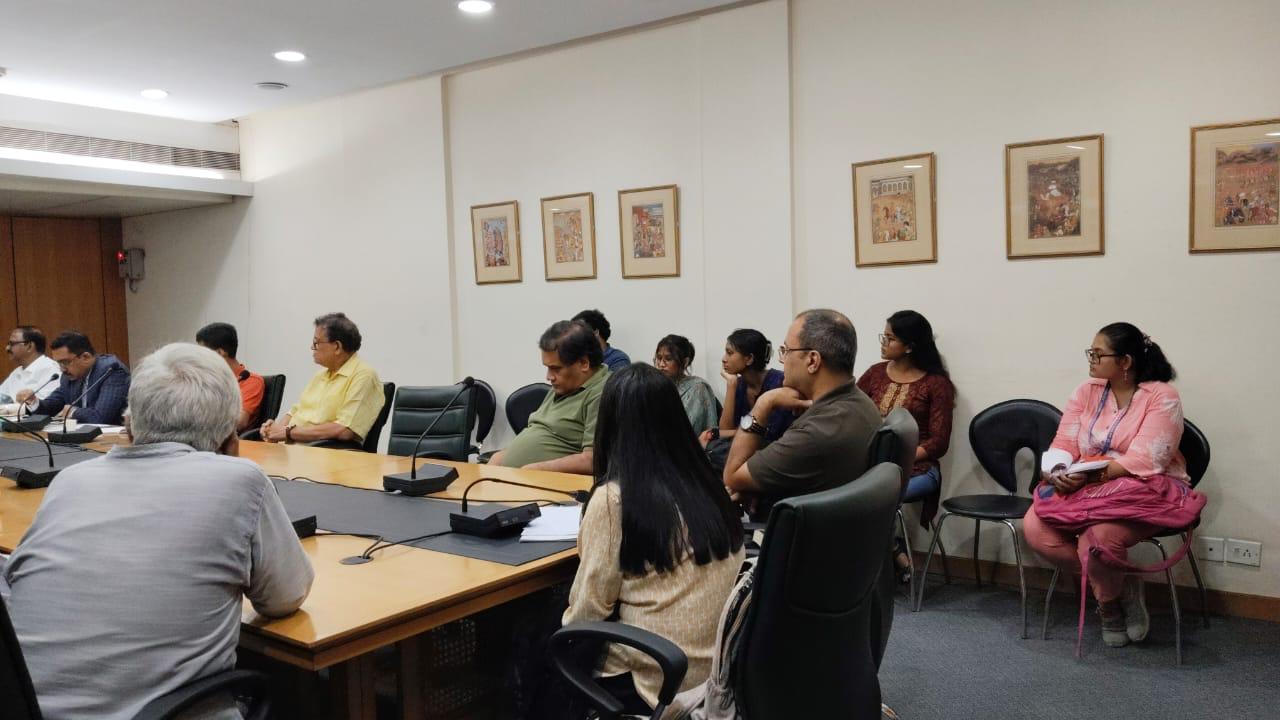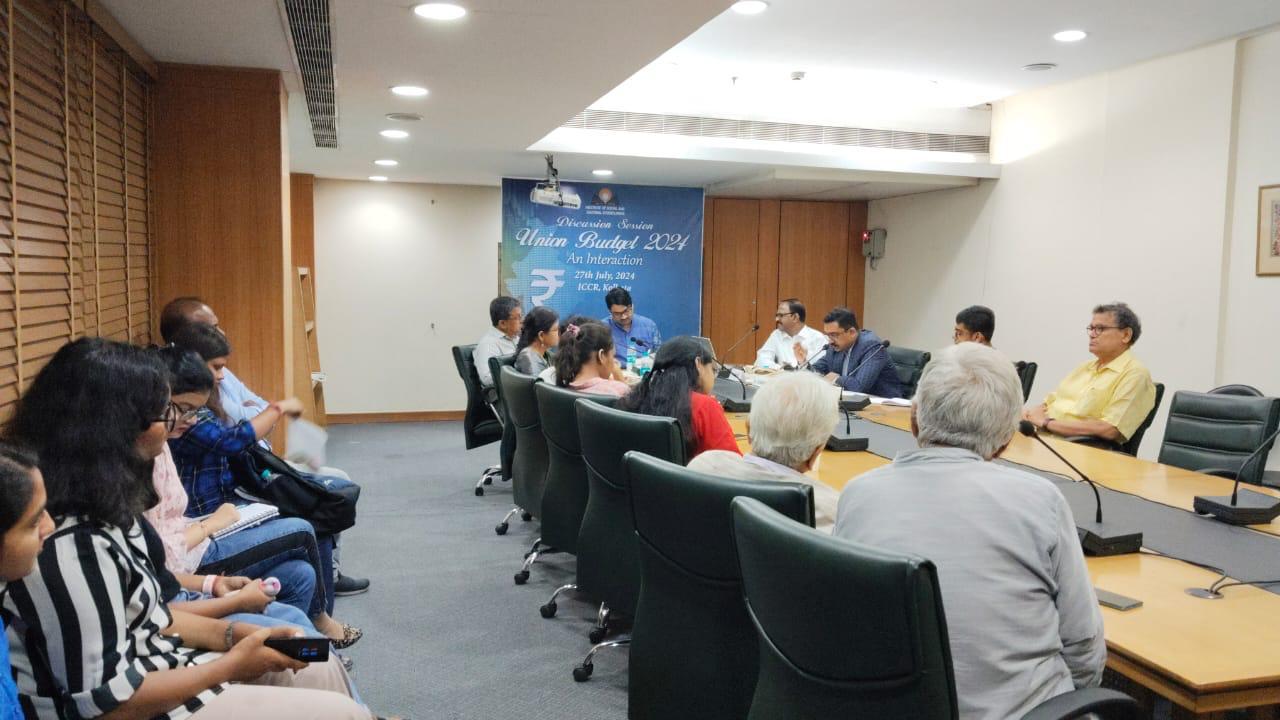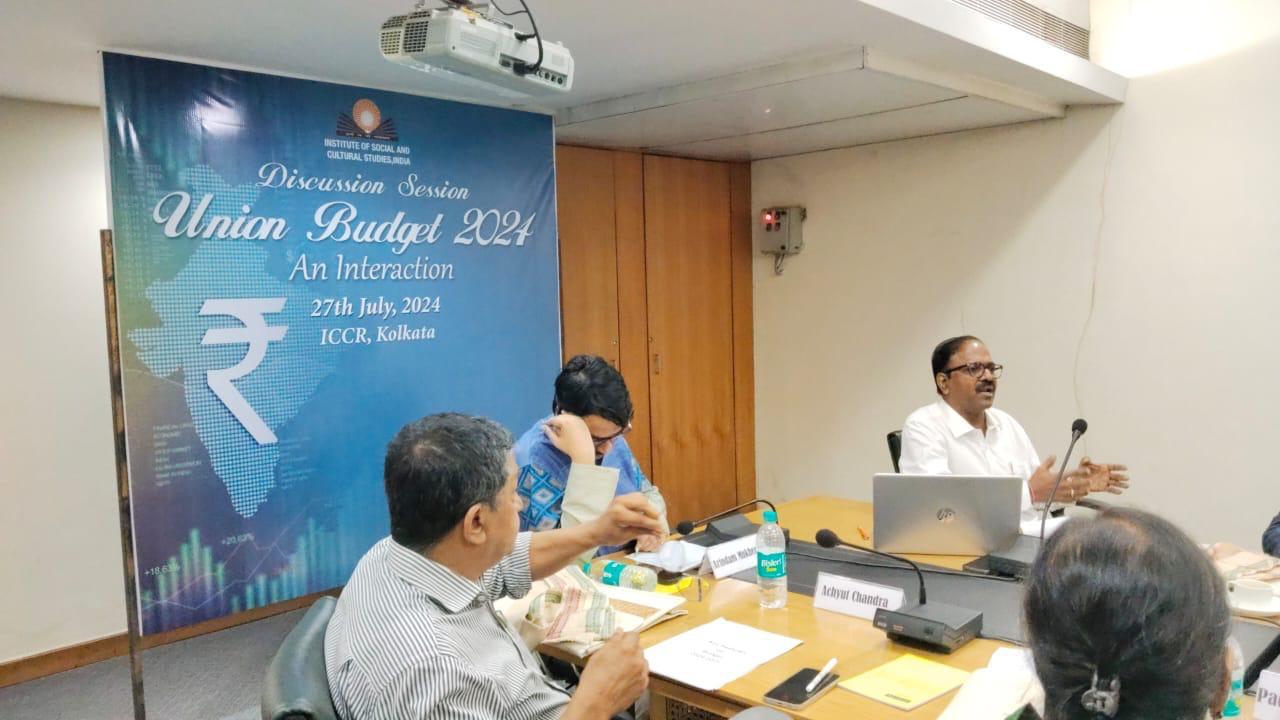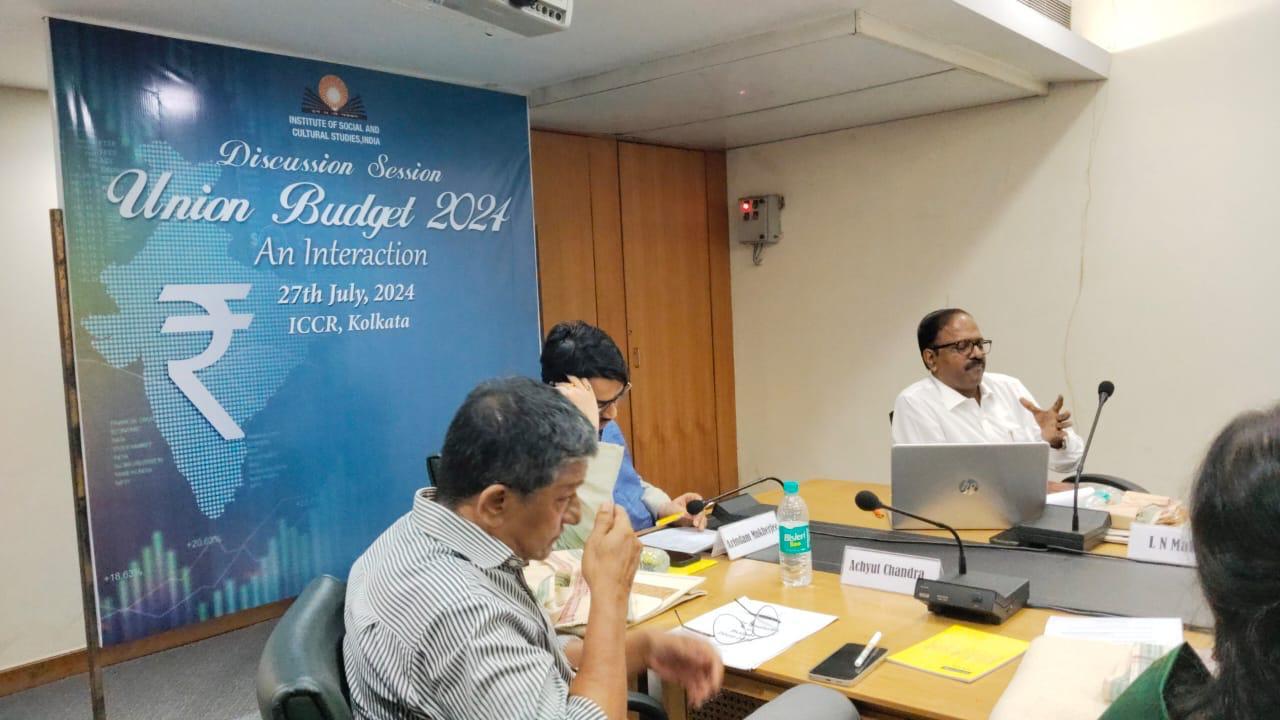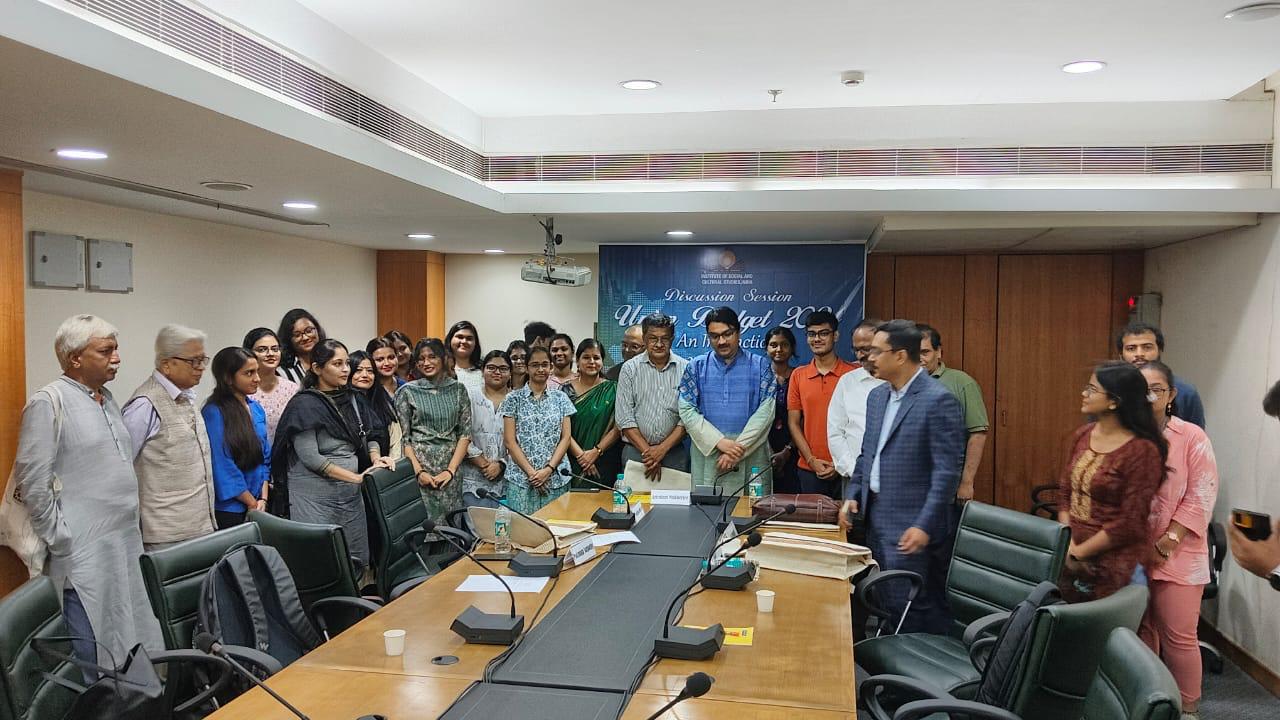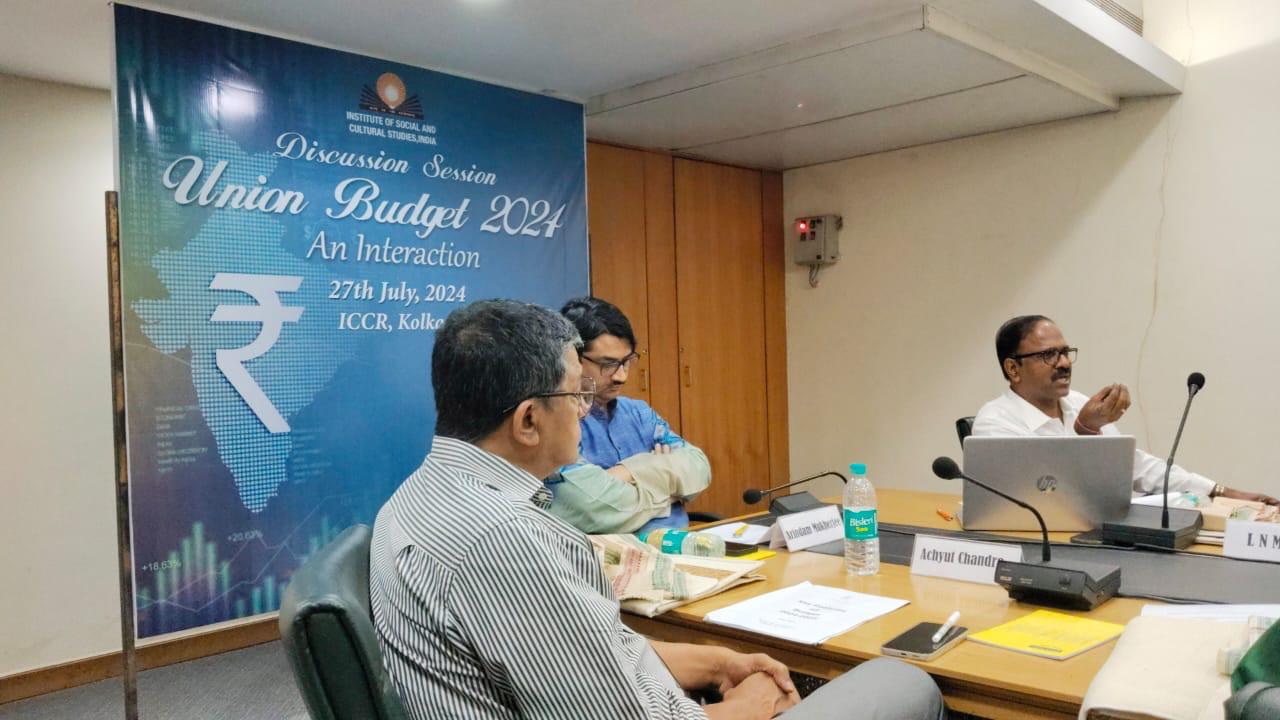Discussion Session on Union Budget 2024
Rabindranath Tagore Centre, The Indian Council for Cultural Relations (ICCR), Kolkata
The Institute of Social and Cultural Studies being an Eastern India based Think Tank confers on the development perspective of the region from diverse angles. The Institute also have been the reviewing how the Union Budget have been laying down a path of progress of the region through policies and investment cycles with each passing year. Thereby following the trend institute on the evening of 27th July 2024, Saturday organized a group discussion session with multi sect oral stakeholders. The discussion was chaired by the Director of the Institute Shri Arindam Mukherjee, himself. While the other speakers comprised of Shri Achyut Chandra- President, Eastern India Corrugated Box Mfg. Association, – Smt. Padmaja Satpathy – GM, Sales, Steel Authority of India Limited, Kolkata HQ, Dr. Arindam Saha- Managing Director, Feed Sense AI & Shri Laxmi Narayan Mallik – Retd. Executive Director, SAIL.
The discussion initiated with the felicitation of the dignitaries, followed with the welcome remarks by the Chairperson of the Session – Shri Arindam Mulkherjee, who did set the stage for the discussion manifesting that Union Budget 2024 had accede an immense of importance towards the sectors like defense, education, health and industry and with that he handed over to the first speaker of the session Shri Achyut Chandra, who elucidated how the Union Budget 2024 like every year have been a thermometer to pulsate a balance between the growing needs of society and implantation of industry especially MSME’s. He did drive in the audience to multiple sectors including festivities, agriculture, tourism that pumps the economy of our country and thus he featured that the Union Budget had rightly understood these areas and have unfurled policies, investment approaches towards these key areas respectively. He further added that in terms of MSME’s the thrust on Atma Nirbhar Bharat that engages the youth with production of indigenous products is also a lucrative and a viable approach to spring up employment amongst youths, but for the approach to remain sustainable proper training needs to be implanted. Although in order to attain the objective the government remained focused on building digital and skill training centers along with a provision of providing collateral free loans for the startups.
As Shri Chandra have been associated with packaging sector, he emphasized on the training and improvement to be brought in the sector to prevent wastage, spillage of goods and materials with transportation and storage of goods. With respect to the growth of West Bengal he mentioned that government should focus on boosting on state grown crops including jute, potato and rice while introducing a mechanism to curtail the middleman interference ensuring farmers as significant beneficiaries. He added that the West Bengal business summits can cater a consortium of investors and business forums but it is important to understand state’s characteristics, geographical trends, infrastructural capacities before introducing a new product and finally the speaker concluded that the main attraction of the state is its fertile geography that have pulled Mughal to British towards East and thus irrespective of opines and tantamount ego’s among governments and stakeholders will remain the first choice for the investors.
The Second Speaker Smt. Padmaja Satpathy mentioned that the Union Budget 2024 had been optimistic towards the growth and development of Purvodaya region. Eastern India has always served as a nexus for development as it is surrounded by ports, natural resources that for centuries till date continues to fuel the nation’s economy. As the speaker hails from Steel Sector, she added that whether it’s TISCO in 1907 to Durgapur to Rourkela, Villai the eastern India has been a steel belt- which is a back bone of any industry whether it’s housing, infrastructure car manufacture, petro chemical etc. Thus Union Budgets approach of harping National Steel Policy would further enhance the steel sector as it aims to produce 300 metric tons of steel. The growth in the steel sector aims at propounding greater heights in GDP and would also create employment opportunities for the youth of our nation. Eastern India has no dearth of natural resources and manpower. A vital investment will create a cycle of production- consumption and growth. The speaker stressed on facilitating skill training provisions in order to train resource persons with the industrial essentialities.
The third Speaker of the session, Shri Arindam Saha did throw light on the agricultural sector- he mentioned that in parallel to the investments focus should be laid on enhanced commodity exchanges, transparency in price, rightful enactment of farmer’s bills and holistic mechanism to tactfully erase the middleman cycle. In context to West Bengal he added that the region has extremely fertile land which can facilitate 3 crops marking a huge production. Policies, practices and lack of training and management in the packing sector creates a shield for the state from achieving economic benefits. He also mentioned a government approach to enhance natural farming –for which an infrastructure needs to be designed as natural crop production, unlike the regular crop which has certain restrictions and reservations, which should be fulfilled.
The speaker’s deliberation repeatedly marked the necessity of digitization – as digital crop surveys through use of satellites and other technological involvement can help farmers to introduce new technologies and advanced production practices. He added that NABARD (National Bank for Agricultural and Rural Development) promotes agro tech startups as compared to many in other states, West Bengal has only 18 till now. Therefore in order to promote agricultural economy in the state, the state should focus on promotion of Start Ups’- Cooperation and APO’S.
The final speaker of the session Shri Laxmi Narayan Mallik- stated that the Union Budget 2024 aimed towards a creation of Vikshit Bharat- which defines Vikas Bhi Virasat Bhi, signifying on making progress while transpiring rich traditional legacies. He forayed on the lucrative schemes being unfurled towards Purvodaya, mentioning that Purvodaya can become an instrument towards the development of Eastern India. Purvodaya as the region can act as a liaison in terms of connectivity and trade for the North East with the rest of the country altogether.
Therefore the budget had been generous on developing a business hub in Purvodaya with 12 Industrial Parks, business corridors between Kolkata to Amritsar that will eventually turn the region into a living industrial sector. Connectivity within Purvodaya had attained importance as the road belt between Buxar- Bhagalpur, Darbhanga- Rajgir, Bridge over Ganga at Buxar and Ring Road between Kharda to Cuttack is being aimed at Apart from infrastructure, power stations at Bhagalpur are also being planned. The speaker mentioned that the government through policy mechanisms are now aiming towards the development of eastern India in a more structured way. Tourism also accord a lot of emphasis, as temple conservation, preservation will not only generate revenues through tourism but would also generate employment for the youths. The Union Budget 2024 surfaced government intentions to synthesize eastern India as an epic of development. Although it’s the time that would narrate whether and to what extent the Vikshit Bharat 2047 mission will be able to attain inclusive growth matching growth trajectory with demands of rising population.
The session also summed up itself with an interactive session between the speakers and audience followed with the observations by the Chairperson and Vote of Thanks.




